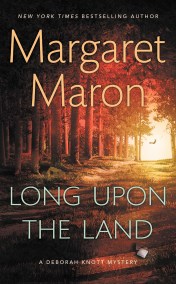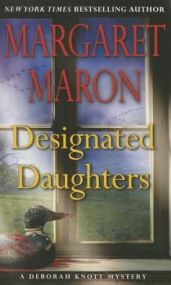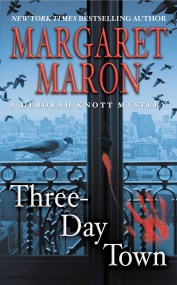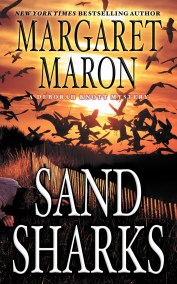Shopping Cart
Description
Margaret Maron, New York Times bestselling author and Mystery Writers of America Grand Master, returns to Colleton County with an exciting Deborah Knott mystery . . .
LONG UPON THE LAND
On a quiet August morning, Judge Deborah Knott’s father Kezzie makes a shocking discovery on a remote corner of his farm: the body of a man bludgeoned to death. Investigating this crime, Deborah’s husband, Sheriff’s Deputy Dwight Bryant, soon uncovers a long-simmering hostility between Kezzie and the slain man over a land dispute. The local newspaper implies that Deborah’s family may have had something to do with the murder-and that Dwight is dragging his feet on the case.
Meanwhile, Deborah is given a cigarette lighter that once belonged to her mother. The cryptic inscription inside rekindles Deborah’s curiosity about her parents’ past, and how they met. For years she has wondered how the daughter of a wealthy attorney could have married a widowed, semi-illiterate bootlegger, and this time she’s determined to find the answer.
But why are Deborah’s brothers so reluctant to talk about the dead man? Is the murder linked to Kezzie’s illegal whiskey business? And could his courtship of Deborah’s mother have something to do with the bad blood between the two families? Despite Deborah’s promise not to interfere in Dwight’s work, she cannot stop herself from doing everything she can to help clear her brothers and her father from suspicion . . .
LONG UPON THE LAND
On a quiet August morning, Judge Deborah Knott’s father Kezzie makes a shocking discovery on a remote corner of his farm: the body of a man bludgeoned to death. Investigating this crime, Deborah’s husband, Sheriff’s Deputy Dwight Bryant, soon uncovers a long-simmering hostility between Kezzie and the slain man over a land dispute. The local newspaper implies that Deborah’s family may have had something to do with the murder-and that Dwight is dragging his feet on the case.
Meanwhile, Deborah is given a cigarette lighter that once belonged to her mother. The cryptic inscription inside rekindles Deborah’s curiosity about her parents’ past, and how they met. For years she has wondered how the daughter of a wealthy attorney could have married a widowed, semi-illiterate bootlegger, and this time she’s determined to find the answer.
But why are Deborah’s brothers so reluctant to talk about the dead man? Is the murder linked to Kezzie’s illegal whiskey business? And could his courtship of Deborah’s mother have something to do with the bad blood between the two families? Despite Deborah’s promise not to interfere in Dwight’s work, she cannot stop herself from doing everything she can to help clear her brothers and her father from suspicion . . .
Newsletter Signup
By clicking ‘Sign Up,’ I acknowledge that I have read and agree to Hachette Book Group’s Privacy Policy and Terms of Use
Praise
"Bestseller Maron's 20th Deborah Knott mystery (after 2014's Designated Daughters) combines strong plotting, a superb cast of recurring characters, and a rare sense of place that transports readers to rural North Carolina. District court judge Deborah and the huge Knott clan headed by Deborah's father, reformed bootlegger Kezzie Knott, become involved in a murder investigation when Kezzie finds Vick Earp bludgeoned to death on the family farm. Vick and his Earp relatives have had an ongoing feud with the Knotts. When Deborah's lawman husband, Dwight Bryant, is appointed lead investigator, the victim's uncle, Joby Earp, is quick to stir up charges of favoritism. Providing counterpoint to the murder case is the backstory of Deborah's mother, Sue Stephenson, and Sue's relationship with the mysterious Capt. Walter Raynesford McIntyre, of the U.S. Army Air Corps, whom she meets in 1943 at a USO club. It all adds up to another sparkling chapter of the Knott family saga."
—Publishers Weekly (Starred Review)
"Maron proves as adept as ever at melding a central mystery with an involving family story...Maron emphasizes the close relationships of Deborah's extended family and the way their rural lifestyle connects them to the land, which makes for an especially heartwarming read."
—Booklist
"Sprinkled with the low-country vernacular and the wonderful characters of Colleton County, NC, this title is a worthy addition to Maron's series."
—Library Journal
"This author knows how to draw you in! The family interaction made me so curious that it was impossible to put down."
—Suspense Magazine
"It's a wonderful read that answers many questions for long-time readers but not so many that it spoils earlier mysteries in the series for new readers."
—News & Observer (NC)
Praise for DESIGNATED DAUGHTERS:
In DESIGNATED DAUGHTERS, practically the whole clan shows up at the hospice where Aunt Rachel has interrupted the process of dying to deliver a rambling account of all the things that have been on her wandering mind. It's quite a lovely deathbed aria, narrated in the honeyed accents of the region. But someone must have feared Aunt Rachel might divulge a buried secret because that someone creeps into her room and smothers her with a pillow.
Maron knows how to adorn a solid murder mystery with plenty of ancillary entertainments. But her broader theme involves the way families flourish when they work together for the common good. While there are charming scenes of group projects like building a pond shed and assembling a bluegrass band, the clan members Maron really cherishes are those who devote themselves to caring for the elders of the family. Living saints they are, every last one of them.
—New York Times Book Review
In DESIGNATED DAUGHTERS, practically the whole clan shows up at the hospice where Aunt Rachel has interrupted the process of dying to deliver a rambling account of all the things that have been on her wandering mind. It's quite a lovely deathbed aria, narrated in the honeyed accents of the region. But someone must have feared Aunt Rachel might divulge a buried secret because that someone creeps into her room and smothers her with a pillow.
Maron knows how to adorn a solid murder mystery with plenty of ancillary entertainments. But her broader theme involves the way families flourish when they work together for the common good. While there are charming scenes of group projects like building a pond shed and assembling a bluegrass band, the clan members Maron really cherishes are those who devote themselves to caring for the elders of the family. Living saints they are, every last one of them.
—New York Times Book Review








